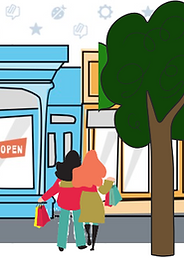top of page
Benefits of Urban Forestry
Over 40 years of research have shown Urban Forests are beneficial to people, wildlife, economies, and the environment. Below are just some of the many benefits of urban forests.
Social
Reduce Crime Rates & Violence Well-managed urban forests reduce crime by encouraging the presence of people, promoting mental health, & creating an aura of a cared for environment.
Parker, 2018; Troy, Grove, and O’Neill-Dunne, 2012

Social
Promote Well-being - Reduce stress, heart rate, blood pressure. General mental & spiritual well-being is improved
Karden et. al, 2015, Ulmer et al., 2016

Social
Inspire a Sense of Community - People in treed areas have a stronger feeling of unity & cohesion with neighbours. They like where they are living more
I
Kuo, 2003; Westphal, 2003

Social
Add Beauty - Can hide unattractive features like walls, freeways, & parking lots. Create attractive business districts.
Price, 2003; Tyrväinen, Pauleit, Seeland, & de Vries, 2005

Social
Promote Health - Encourage physical activity, decreasing obesity, asthma, & other chronic conditions. Decreases recovery time. Increases energy levels
Ulrich, 1992; Cooper Marcus, 2007; Mytton, Townsend, Rutter, & Foster, 2012

Social
Improve Road Safety - Reduce fatigue & stress, slow traffic, and increase attention
Mok, Landphair, & Naderi, 2006; Naderi, 2003

Social
Reduce Noise Pollution
Karden et. al, 2015
_edited.jpg)
Social/Economic
Favorable Impressions - Visitors & tourists have a more positive perception of cities with urban forests.
Andrada & Deng, 2010

Economic
Increase City Values - Urban trees add value of between $1.88 and $12.70 for every dollar spent on maintaining them, depending on the city.
(Alexander & McDonald, 2014).

Economic
Increase Home Values - Landscaping with trees can increase property value by 20% & provides a 200% increase on investment when selling
Escobedo, Adams, & Timilsina, 2015

Environmental
Regulate Water -
Improve water filtration, store water, and reduce stormwater runoff
Berland, 2017; Bartens, Day, Harris, Dove, & Wynne, 2008

Enviromental
Increase Biodiversity - Birds, reptiles, mammals, and insects live in or are protected by urban forests Fish & amphibians use urban forests above them for shade and protection
Sandström, Angelstam, & Mikusiński, 2006

Environmental
Carbon Capture -
Karden et. al, 2015

Environmental
Reduce City Temperatures
Brandt et al., 2016; Sinnett, 2018

Environmental/Social
Filter Air-
Karden et. al, 2015

Environmental/Social/Economic
Reduce Energy Needs -
Nowak, Hoehn, Bodine, Greenfield, & O’Neil-Dunne, 2016; Akbari, 2002; Akbari & Taha, 1992

Social
Provide Food -
Karden et. al, 2015

Social
Prevents Erosion
Parker, 2018; Troy, Grove, and O’Neill-Dunne, 2012

Economic
Deferred Street Maintenance Costs - Repaving of heavily shaded streets can defer repaving for up to 25 years; well shaded streets up to 10 years
I
Kuo, 2003; Westphal, 2003

Economic
IIncrease Revenue - Shopping areas with trees attract customers who stay longer. Consumers are willing to pay more for goods. Goods are rated higher quality & the shopping experience is seen as more comfortable. .
Wolf, 2004

bottom of page


